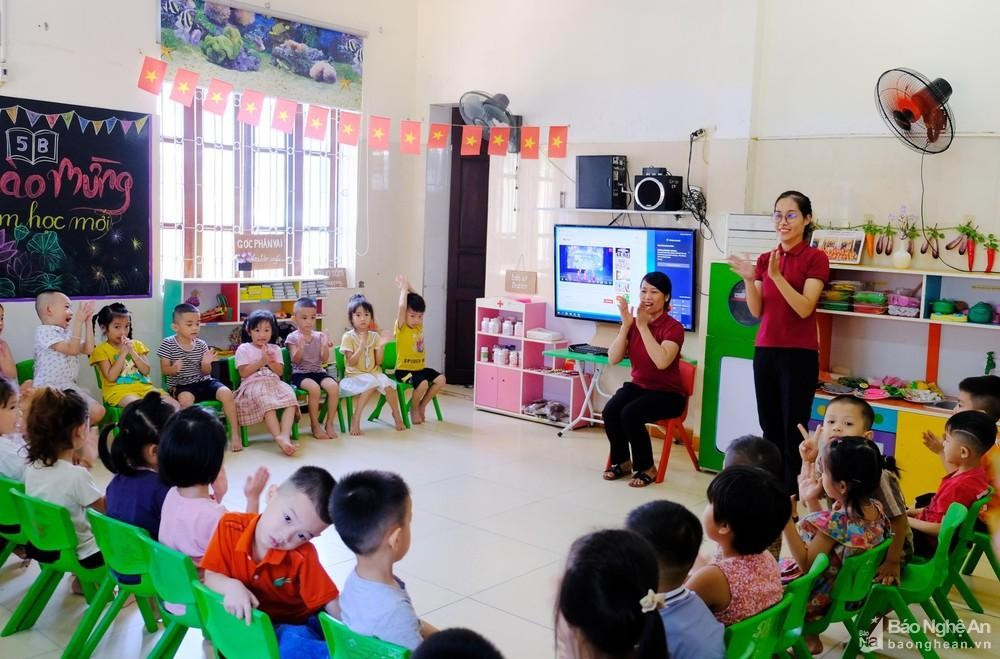Concerns about the salary gap between preschool and primary school teachers: What does the Ministry of Education and Training say?
The Ministry of Education and Training has just responded to teachers' concerns regarding the mismatch between professional title appointments and salary scales between preschool and primary/secondary education.
Regarding this matter, the Department of Teachers and Management Staff (Ministry of Education and Training) explains that currently, the Government stipulates a common salary scale for all civil servants in all sectors and fields. Specifically, this is Table 3 – Salary scale for professional and technical staff in state-owned public service units in Decree No. 204/2004/ND-CP dated December 14, 2004, regulating the salary regime for officials, civil servants, and armed forces personnel.
Accordingly, the salary coefficient for civil servants of category A0 is applied to those requiring a college degree; the salary coefficient for civil servants of category A1 is applied to those requiring a university degree.

Based on the required training standards for preschool and primary school teachers as stipulated in the 2019 Education Law:
- Preschool teachers of rank III (the starting rank, requiring a college degree) are subject to the salary coefficient of civil servants of type A0 (from salary coefficient 2.10 to salary coefficient 4.89);
- General education teachers of rank III (the starting rank, requiring a university degree) are subject to the salary coefficient of civil servants of type A1 (from salary coefficient 2.34 to salary coefficient 4.98).
Therefore, the salary scale applied to preschool teachers of grade III and general education teachers of grade III is basically not much different.
However, there is a relatively large difference in the salary scale applied to preschool teachers of grade II and general education teachers of grade II:
- Kindergarten teachers of rank II are subject to the salary coefficient of civil servants of type A1 (from salary coefficient 2.34 to salary coefficient 4.98);
- General education teachers of rank II are subject to the salary coefficient of civil servants type A2.2 (from salary coefficient 4.0 to salary coefficient 6.38).
However, according to the Ministry of Education and Training, for general education teachers to be eligible to register for the exam or be considered for promotion to the professional title of Grade II general education teacher, they must have held Grade III or equivalent for at least 9 years; while preschool teachers only need to have held Grade III or equivalent for at least 3 years (although Decree 204/2004/ND-CP stipulates a minimum of 9 years). This is a preferential policy of the Government for preschool teachers due to the unique characteristics of their profession.
The Ministry of Education and Training stated that in the future, when the Government implements the salary policy reform (according to Resolution No. 27-NQ/TW dated May 21, 2018), the State will pay salaries to officials, civil servants, public employees, and members of the armed forces based on job positions, titles, and leadership roles, in line with the State's resources and revenue from public service activities, ensuring a reasonable correlation with salaries in the labor market.
At the same time, it is essential to ensure that wages truly constitute the primary source of income guaranteeing the livelihood of workers and their families; to adhere to the principle of distribution according to labor and the objective laws of the market economy, and to use increased labor productivity as the basis for wage increases…

According to the Ministry of Education and Training, teachers and education administrators are entitled to policies including: salary, seniority allowance exceeding the standard rate, leadership position allowance (if any), regional allowance, preferential allowance, seniority allowance, and some other policies.
Teachers and education administrators working in mountainous, highland, and areas with particularly difficult socio-economic conditions are entitled to several benefits, such as higher preferential allowances compared to teachers working in lowlands and cities; additional allowances and subsidies such as attraction allowance; long-service allowance; initial allowance; one-time allowance when transferring out of areas with particularly difficult socio-economic conditions; reimbursement for travel expenses during annual leave or Tet holiday; allowance for purchasing and transporting fresh water and clean water; mobility allowance; allowance for visits, study tours, and professional development.
In accordance with Resolution No. 27-NQ/TW, the Ministry of Education and Training is tasked with coordinating with the Ministry of Interior to propose a salary scale for the education and training sector based on job positions, titles, leadership roles, and the nature and complexity of the work. This includes proposing the highest level of professional incentive allowances to partially improve teachers' income.
The Ministry of Education and Training stated that it is currently developing a Law on Teachers and expects that policies on salaries, allowances, recruitment, employment, and training of teachers will be stipulated in the Law on Teachers.



